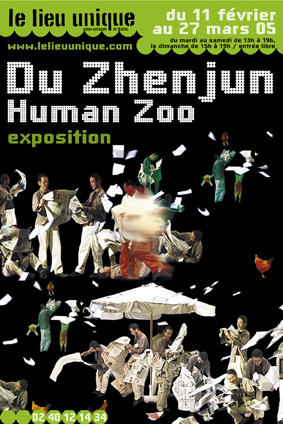


11 February - 27 March 2005
Installations:
Chienman, Cover, Fountain, Human Zoo, I Erase your Trace, It Hurts me every Minute, Dr. Du Zhenjun' Anatomy Lesson, Ombres, We seek the Ligh, Disturbance, Presumption, A Week in the World of Du Zhenjun and Wind.
Curator: Richard Castelli (Epidemic)
A Dishonest Preamble
I will never forget the look on the faces of visitors as they made their way through I Erase your Trace.
Their initial reaction was one of pretty straight forward amusement, owing to the playful situation in which they found themselves—being trailed by a group of Du Zhenjun, all of whom were laboriously working to erase the visitors' traces. It quickly turned into an awkward smile though, when they realized that these Du had had tomake themselves slaves in order to follow them around. Finally, visitors became visibly uncomfortable once they realized just how amusing they had found it all, only seconds before.
Most of the works by Du Zhenjun oscillate between the playfulness of their presentation and the tragedy of their content (or, sometimes, the reverse is the case). All of them call for multi-layered interpretations.
Seductive enough in terms of his humor as well as in terms of his denunciation of the foibles of our world ; proper enough to have gained the trust of right-thinking people ; cynical enough (in both senses of the word) to have earned the right to the smallest marginal subversion, one likely necessary for any on-going recognition from the West's inner-circle, Du Zhenjun has thought of everything.
Du Zhenjun is a dishonest artist or rather he has to be, for the real cheats are not being exposed. Like Roland Topor, who was asked by a journalist to lend precision to his religious ideas, Du Zhenjun could also say, "I'm just acting the devil."
© Richard Castelli
Exhibition curator
Our planet: a human zoo?
Our civilization: a bunch of cages for the “human animal”?
Our world is the grounds on which hunting parties take place, and so it provides a spectacle of human hunters, each taking aimat its fellow creature, another human hunter.
The human gets exited, he piques his excitement and stirs up those in his entourage just as an animal in the zoo does, by rattling his cage up against that of his neighbor.
Ever sinceman was liberated fromhaving to live in the shadow of God, he has thought of himself as god-like.
Clean, moral and virtuous, exercising control over everything he wants and everything he does,man has almost forgotten his own origins and his own basic nature, has almost forgotten that he is, in fact,merely an…animal.
In order to survive, social animals gather together to formcommunities that are organized around shared activities: families, regions, nations, religions, etc…Every community develops its own systemof values, its ownmorality, and every community cruelly defends its own “territory,” indeed, it tries to extend its field of influence. In the name of what? Faith? Freedom? Aparticular religious or political idea? Pretexts, all of them!
We know they are just pretexts, for if a human group could find no reason to enter into conflict with another human group confronting it, it would turn the object of its battle against itself: war would then become internalized and turn into “civil war.”
We know they are just pretexts, for if a human individual did not have to do battle in the name of his group or tribe, he would then have to do battle “in his own name,” against “his brothers.”
Man’s animal nature pushes himtomake himself ferocious, irrespective of the target for his ferocity. His libido, his potential for violence, finds fulfillment in banding together, like animals, “against.”
Like a predator hunting its prey, one that excites and exults,man directs his energy toward and really sinks his teeth into competitions of every kind: social, economic, athletic, artistic, even virtual competitions…Man gets excited: he drains his energy and unleashes his violence, and he tirelessly invents the terrain, the imaginary, and the rules of the game for the savagery that inhabits him.
© Du Zhenjun
December 2004
